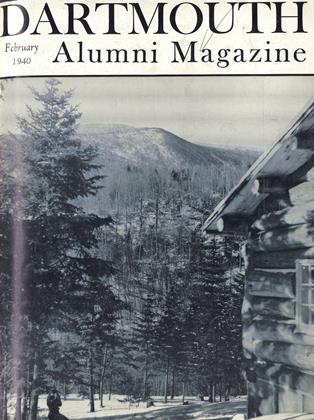PROFESSOR LLOYD P. RICE of the Department of economics has returned to his teaching in the College after an absence of seven months, during which time he has been serving as Financial Adviser to the Philippine Islands Government where the revision of the Tax System was carried on. As the position of the United States in the Orient has become a matter of heightened concern, both because of the far-reaching effects of the European War and the question of trade relations with Japan, Professor Rice's findings and impressions are especially interesting at this time. Mrs. Rice, who accompanied him on this trip, did considerable traveling about in the Island group.
"Gold is where you find it," and PROFESSOR HAROLD M. BANNERMAN of the Department of Geology may be the cause of an inrush of prospectors into the New Hampshire Hills, as the result of a talk given before the Dartmouth Lake Sunapee Region group recently. Professor Bannerman urged that a comprehensive survey of the region be made in order to determine whether or not rich ores exist in any quantity. There are many new uses for a variety of minerals, he said, which were considered useless fifty years ago, and a survey would determine to what extent these minerals are to be found in local hills. He is quoted as saying however, that he doubted if the desirable minerals exist in sufficiently large deposits for commercial exploitation.
Considerable discussion was created at a recent meeting of the New England Association of Colleges and Secondary Schools by PROFESSOR RALPH A. BURNS of the Dartmouth Department of Education, when he was quoted as saying that "the normal school is the spoiled child of the state departments of education." In tracing the rise of the normal school in the Twentieth Century, and its evolution into the Teachers' College, Professor Burns implied that the neglect of certain cultural colleges to provide teacher-training responsibility brought about much of the growth of these institutions, and unless the system in vogue at present is changed, the liberal college must go out of business entirely in the matter of training teachers. In some liberal arts colleges the fight was given up long ago, but others still battling may win out.
Science has come to the aid of old New England common sense in proving that good crop years follow a mild March and April. PROFESSOR CHARLES J. LYON, who now and then discovers the age of a bridge or building by consulting the wood-rings in the construction material, told members of the American Association for the Advancement of Science, recently, that as a result of study of the trees blown down by the famous hurricane of 1938, growing years of trees show greater results when these months are warm. The answer is that snow and spring rain water under such conditions seep into the ground instead of running off into rivers. "When Spring is mild, the crops run wild" is an old New England saying.
 View Full Issue
View Full Issue
More From This Issue
-
 Article
ArticleMore Than Professor
February 1940 By JOHN HURD JR. '21 -
 Article
ArticleThe College In The Sixties
February 1940 -
 Class Notes
Class Notes1915*
February 1940 By CHARLES R. TAPLIN -
 Article
ArticleEducation Without Books
February 1940 By Davis Jackson '36 -
 Sports
SportsBig Green Teams
February 1940 By Whitey Fuller '37 -
 Article
ArticleHanover Browsing
February 1940 By HERBERT F. WEST '22
E. P. K.
-
 Books
BooksBYSTANDER
MAY 1930 By E. P. K. -
 Books
BooksABENAKI INDIAN LEGENDS, GRAMMAR AND PLACE NAMES.
December 1932 By E. P. K. -
 Article
ArticleThe Faculty
January 1939 By E. P. K. -
 Article
ArticleThe Faculty
February 1939 By E. P. K. -
 Article
ArticleThe Faculty
May 1939 By E. P. K. -
 Article
ArticleNOTES ON THE FACULTY
December 1940 By E. P. K.
Article
-
 Article
ArticlePASTOR OF CHURCH OF CHRIST SUFFERS NERVOUS BREAKDOWN
January, 1925 -
 Article
ArticleThe 1950-51 Budget
December 1950 -
 Article
ArticleFoley of Foley, Vt.
DECEMBER 1967 -
 Article
ArticleNew Alums Hit the Streets
Sept/Oct 2009 -
 Article
ArticleBY THE NUMBERS
MAY | JUNE 2016 -
 Article
ArticleAlumni News
Nov/Dec 2009 By Yaz Krehbiel ’91, Th’92

